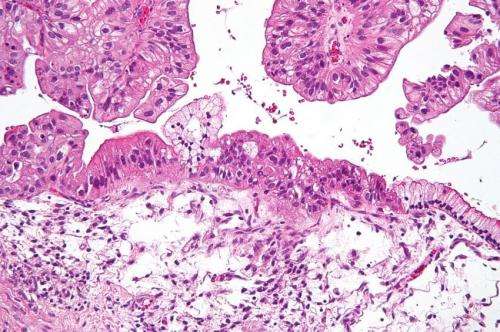Risk-reducing mastectomy questioned for BRCA mutation carriers with prior ovarian cancer

Mutations in the BRCA gene correspond to a higher lifetime risk of developing breast and ovarian cancers, and many women who carry these mutations consider undergoing mastectomy or removal of the ovaries and fallopian tubes as preventive measures.
But for the subset of women with BRCA mutations who have already had ovarian cancer, risk-reducing mastectomy might not be worth the price tag. New research from the Duke Cancer Institute finds that for many women in this unique group, prophylactic mastectomy does not produce a substantial survival gain and is not cost-effective.
The finding is especially noteworthy because of updated National Comprehensive Cancer Network guidelines recommending that many women with ovarian cancer be considered for genetic testing regardless of family history. Now, more than ever before, some women with ovarian cancer are also learning that they carry a BRCA mutation.
"Risk-reducing mastectomy is costly and can require many months of follow-up and recovery," said Charlotte Gamble, M.D., the study's lead author and a resident physician at Duke University School of Medicine. "Our results emphasize that prophylactic mastectomy should be used selectively in women with both a BRCA mutation and a history of ovarian cancer."
In the study, published online July 11 in the journal Annals of Surgical Oncology, Gamble and co-researchers constructed a statistical model comparing risk-reducing mastectomy to breast cancer screening, including mammogram and MRI. The model incorporated clinical factors such as the age at ovarian cancer diagnosis, time between ovarian cancer diagnosis and risk-reducing mastectomy, BRCA mutation status, cancer survival rates and treatment costs. Risk-reducing mastectomy was compared to breast cancer screening performed every six months following ovarian cancer diagnosis.
The study's authors also considered a cost-effectiveness measurement called the incremental cost effectiveness ratio. Healthcare interventions where this ratio is less than $100,000 per year of life saved are commonly considered cost-effective in medical literature. The authors used the same threshold in this study.
According to the authors' analysis, the benefit of risk-reducing mastectomy over screening alone largely depended on the patient's age at the time of her ovarian cancer diagnosis and time to mastectomy:
For women diagnosed at any age with BRCA 1 and 2 gene mutations and within the first four years after ovarian cancer diagnosis, prophylactic mastectomy was associated with a negligible gain in survival and was therefore not found to be cost-effective;
For women diagnosed at age 60 or older, regardless of time since ovarian cancer diagnosis, the gain in survival months was also negligible and the procedure was not cost-effective;
For women diagnosed at age 40 to 50 with BRCA 1 and 2 mutations and at least five years after an ovarian cancer diagnosis, the procedure was associated with a survival benefit of two to five months compared to screening and found to be cost-effective.
"Our study provides clarity on how a woman's age and timing of a risk-reducing mastectomy after an ovarian cancer diagnosis impact the benefit of this procedure," Gamble said. "Within the first five years, nobody benefitted from risk-reducing mastectomy and after that threshold, survival gains were seen mostly in the youngest, healthiest ovarian cancer patients."
"There is no right or wrong answer on how to manage breast cancer risk in this unique population," added senior author Rachel Greenup, M.D., assistant professor of surgery at Duke. "However, we hope that our findings provide guidance to women and their doctors deciding if and when prophylactic mastectomy is beneficial following ovarian cancer treatment."
More information: Charlotte Gamble et al, Cost Effectiveness of Risk-Reducing Mastectomy versus Surveillance in BRCA Mutation Carriers with a History of Ovarian Cancer, Annals of Surgical Oncology (2017). DOI: 10.1245/s10434-017-5995-z


















